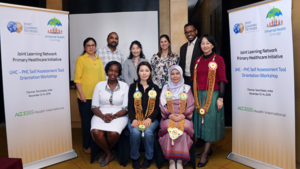PHC Self-Assessment Tool – Path to PHC Reforms – Deliberation Workshop in Chennai, India
The Joint Learning Fund (JLF) supported a three day joint workshop from November 12-14, 2018, in Chennai, Tamil Nadu, India. The purpose of the workshop was to share experiences adapting and implementing the Primary Healthcare (PHC) Self Assessment Tool developed the Joint Learning Network (JLN) for Universal Health Coverage.
The Self-Assessment Tool support alignment of primary healthcare and health financing at the country level. The workshop brought together eight country practitioners and country technical facilitators from five JLN countries (India, Kenya, Malaysia, Mongolia, and Sudan) as well as technical facilitators from Results for Development and ACCESS Health International.
Resource countries who have already implemented the Self-Assessment Tool include India (Tamil Nadu and Kerala states), Malaysia, and Sudan. Countries planning to implement the Tool were Kenya and Mongolia.

The first day of the workshop was dedicated to learning from resource countries about their experiences implementing the Primary Healthcare Self-Assessment Tool, learning about the host states’ primary care system, India’s primary care policy reform, and engaging in small group discussions about how the Self-Assessment Tool has been adapted.
The second day of the workshop the group visited a primary care center in Thirupukuzhi village in Tamil Nadu state. On the final day of the workshop the group discussed reflections from the site visit with input from the Indian hosts, reviewed recently published knowledge products by the primary care initiative of the Joint Learning Network, and discussed opportunities for country adaptation. Finally, resource countries and technical facilitators supported Kenya and Mongolia to develop action plans for implementing the Self-Assessment Tool in their countries.
The workshop participants completed four activities:
- countries that have implemented the Primary Care Self-Assessment Tool (SAT) (India, Malaysia, and Sudan) shared key lessons learned and main challenges they faced implementing the Tool. They also sharedhow the results from the self-assessment informed strategies to improve coordination between primary care and health financing;
- countries planning to implement the Self-Assessment Tool(Kenya and Mongolia), shared their country objectives and developed action plans for implementation;
- all participants engaged in joint learning and community building through discussions about their experiences with primary care reforms; and
- country practitioners were introduced to recently published knowledge products from the Joint learning Network and engaged in a discussion about adaptation of knowledge products within countries.
Some of the takeaways from the workshop were:
- Primary Healthcare Self-Assessment Tool lessons and country adaptation. Tamil Nadu State, Kerala State, Malaysia, and Sudan shared their experiences adapting and implementing the Self-Assessment Tool. Country practitioners believe that the power of the Tool is that it can: jumpstart debate and dialogue on primary healthcare, gives direction to primary health care reform, and builds evidence that influences decision makers. It can be implemented in different ways depending on the financial and human resources available. The experiences shared during the workshop guided the participants fromKenya and Mongolia to develop preliminary action plans for implementing the Self-Assessment Toolin their countries.
- Learnings from Tamil Nadu State. Tamil Nadu State shared interesting innovations in service delivery management and organization including: districts with the flexibility to pool program funds and supplement their resources and manage them according to need; development of the Tamil Nadu Medical Services Corporation to control drug costs; and increasing demand for government primary health care services by moving services closer to the patient with a village health worker cadre. The village health workers receive two years of training.
- Opportunities for adaptation of additional JLN knowledge products. The participants received an introduction to several new knowledge products from the Primary Healthcare Initiative of the Joint Learning Network, including knowledge products related to Private Sector Engagement, Measurement for Improvement, and Health Benefits Policy. There was interest in learning more about how to use these knowledge products. The participants also emphasized the importance of strategic communications in all of their work to achieve universal health coverage in their countries. There was strong interest in learning more about the practical guide and tools for strategic communications developed by the Joint Learning Network.
The participants from Kenya and Mongolia are now sharing the action plans with their respective Country Core Groups and working groups with the objective to use the Self-Assessment Tool to inform reforms of primary care. A WhatsApp group has been created among all the participants to stay in touch and share their experiences as the work moves forward.
